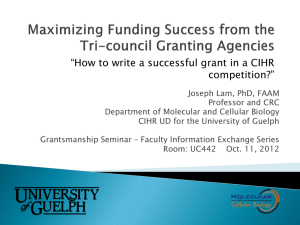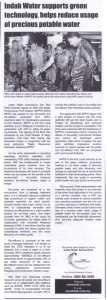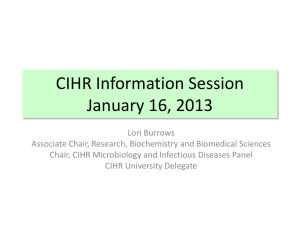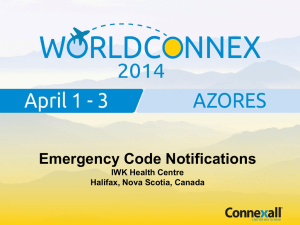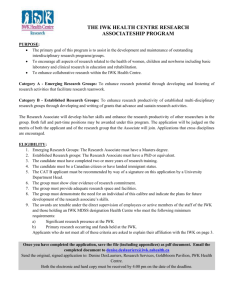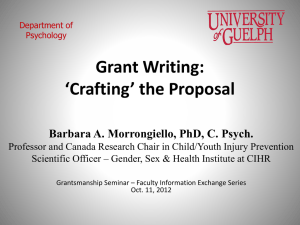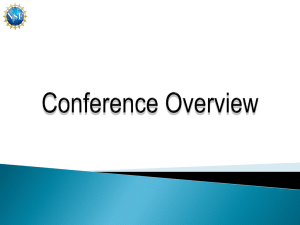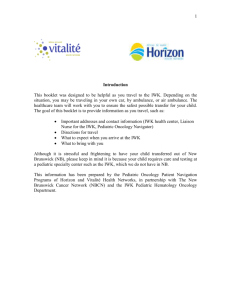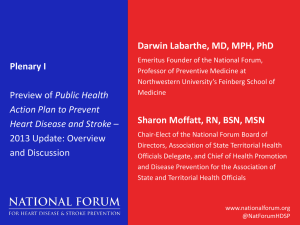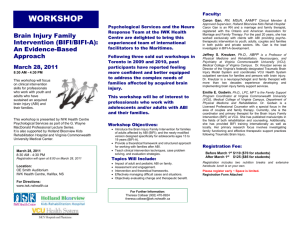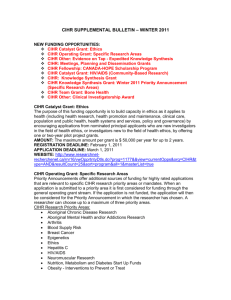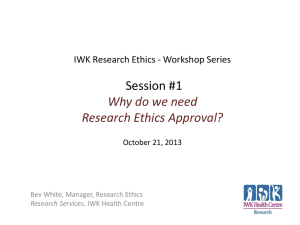Implementation science
advertisement
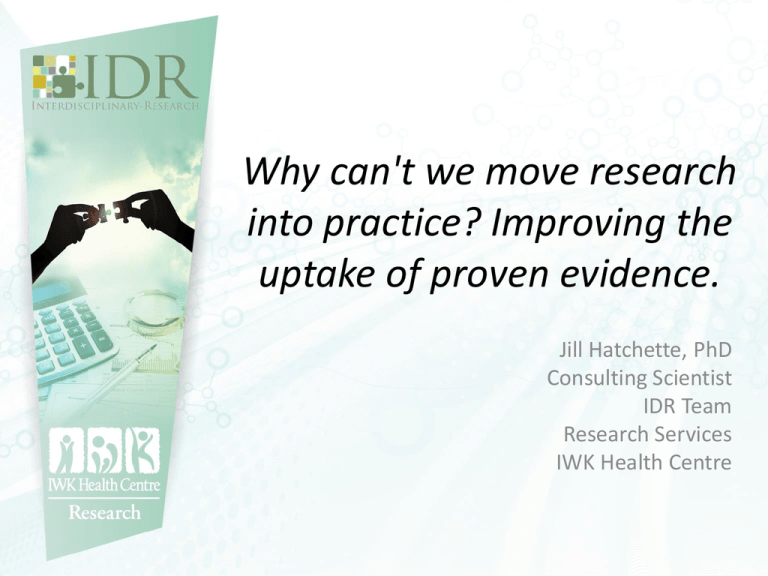
Why can't we move research into practice? Improving the uptake of proven evidence. Jill Hatchette, PhD Consulting Scientist IDR Team Research Services IWK Health Centre First of all….. • What are we talking about when we say “uptake of proven evidence”? – Dissemination? – Synthesis? – Exchange? – Application? – Knowledge Translation? Dissemination • Dissemination involves identifying the appropriate audience and tailoring the message and medium to the audience. • Dissemination activities include: – summaries for stakeholders – educational sessions with • Patients • Practitioners • policy makers – engaging knowledge users in developing and executing • implementation plan, • tools creation • media engagement. CIHR Synthesis • The contextualization and integration of research findings of individual research studies within the larger body of knowledge on the topic. • A synthesis must be – reproducible and transparent in its methods. • E.g. systematic review, follow the methods developed by the Cochrane Collaboration, result from a consensus conference or expert panel or synthesize qualitative or quantitative results. • Realist syntheses, narrative syntheses, metaanalyses, meta-syntheses and practice guidelines are all forms of synthesis. CIHR Exchange • The interaction between knowledge user and researcher, resulting in mutual learning. – collaborative problem-solving between researchers and decision-makers that happens through linkage and exchange. – mutual learning through the process of planning, producing, disseminating, and applying existing or new research in decision-making. CIHR; CFHI Ethically sound application of knowledge • Activities for improved health consistent with ethical principles and norms, social values, as well as legal and other regulatory bodies • Application refers to the iterative process by which knowledge is put into practice. CIHR Knowledge Translation Dissemination + Synthesis + Exchange + Application Implementation Science….KT right? No…. • Implementation research is the scientific study of methods to promote the systematic uptake of proven clinical treatments, practices, organizational, and management interventions into routine practice, and hence to improve health. • Research on implementation addresses the level to which health interventions can fit within real-world public health and clinical service systems. http://www.implementationscience.com/about http://www.fic.nih.gov/News/Events/implementation-science/Pages/faqs.aspx What does implementation science study? • Comparisons of two evidence-based interventions • How to promote the use of evidence based guidelines. • How to adapt an intervention to a different population • How to scale-up effective interventions • The effects of a quality improvement program Why do we need implementation science? • Why can’t we just do the KT and be done? • Research is an iterative process. However, the reality is…. Implementation Science CIHR • The NIH identifies similar areas of “death” • "Research-to-program “ – research evidence is not adequately or appropriately considered and integrated in the development of health outcomes. • "Research-to-policy“ – research evidence is not adequately or appropriately considered and integrated in the development of health policy. Why does implementation fail? • Short answer? – We just don’t DO it. • Preconditions not there – – – – People Attitudes Training Time • Too costly • Too difficult • Just doesn’t fit How is “implementation science” going to make implementation actually happen? • By changing the way we think about research, who we do research with and how we actually do research • Implementation science is: – A new way of thinking – A new, but quickly developing field • JAMA Pediatrics call for papers for Spring 2015 – Challenges: • Current studies and existing research are small • Dissemination remains somewhat localized • Scientific methods are loose • Implementation science is inherently interdisciplinary/multidisciplinary – Collaboration between researchers, implementers, policymakers, the public – Opportunities to learn from each other – Challenges: • Identifying methods of bringing people together communicating in a meaningful way, developing a common interest, goals and language. • Identifying the expectations of researchers and the expectations of those involved in the implementation of new processes. • Implementation science is not: – Your typically scientifically rigorous research – Opens up many opportunities to design research in a context that is locally relevant – Challenges • Researchers and funders will need to appreciate the value of findings from studies that are more loosely controlled than the scientific norm. • Implementation research will require a balance between rigor and real world application • MUST acknowledge that rigor ≠ quality. • Scientific rigor must be balanced with a need to conduct research that applies to real world settings. • Researchers must be open to a range of methods (qualitative/quantitative) and methods existing outside their discipline. TRIC funded implementation science Erna Snelgrove-Clarke, RN, PhD Staff Nurse, Birth Unit and PSCU, IWK Health Centre and Assistant Professor, Dalhousie School of Nursing Jennifer West, BScN, MHS Manager, IWK Health Centre, Birth Unit A change in the approach to how women push when they are fully dilated, or second Stage management, has the potential to increase vaginal deliveries, decrease cesarean births, as well as, decrease the length of Hospital stay for mothers Isabel Smith, PhD Psychologist, Autism Research Centre, IWK Health Centre; Associate Professor, Department of Pediatrics, Psychology and Neuroscience, Dalhousie University Heather Osborne-Vincent, Manager, Rehabilitation Services IWK Health Centre and Barbara Casey, Manager, Mental Health and Addictions Program, IWK Health Centre. Defining a health education partnership for earlier identification and assessment of Autism Spectrum Disorders in school aged children. Goal is to achieve a more efficient detection and more timely diagnosis of Autism Spectrum Disorder to improve academic outcomes for children. Dr. Graeme M. Rocker, Head, Division of Respirology, Capital Health, Professor, Department of Medicine, Dalhousie University Paula Bond, VP, Acute Care, Person Centered Health, Capital Health Expanding the INSPIRED COPD outreach program to the Emergency Department: assessing feasibility, effieciencies and outcomes Karthik Tennankore, MD, FRCPC, Division of Nephrology, Department of Medicine, Capital Health Cynthia Stockman, RN, BScN, MN, Health Services Manager, Outpatient Nephrology, Capital Health The effectiveness of an online portal for the delivery of care to home dialysis patients. Resources • http://www.fic.nih.gov/News/Events/implementationscience/Pages/implementation-science-2010.aspx • http://www.implementationscience.com/ • http://www.cihr-irsc.gc.ca/e/45669.html • http://www.iwk.nshealth.ca/research/iwk-research-fundcompetitions • http://www.cdha.nshealth.ca/discovery-innovation/qeii-fdntric-grants
